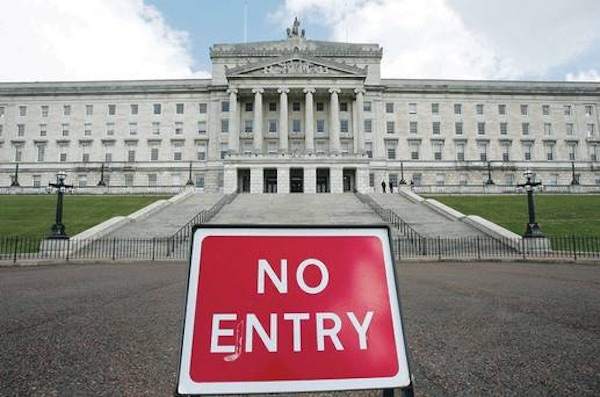
Crisis talks in the north of Ireland have been suspended until June following the decision of the British Prime Minister to call a snap general election, an unexpected move which angered politicians in Belfast and cast new uncertainty over the future of Stormont and its powersharing institutions.
A date of June 29 has now been set as the new talks deadline, the fourth in the current crisis, which allows for just three weeks of talks after the polling date of June 8.
The election announcement was blasted by political rivals as a cynical attempt by May to capitalise on her high ratings in the opinion polls to push through plans for a ‘hard Brexit’. The Tories lead Labour under Jeremy Corbyn by an average of 17 points.
Despite having a slim working majority at Westminster, May had repeatedly ruled out an election ahead of the end of her term of office in 2020. However, she faced the loss of several MPs due to the likelihood of charges being brought against the Tories in relation to allegations of illegal spending in the 2015 poll.
Amid considerable frustration within the Stormont talks process in the aftermath of the announcement, the 26 County Minister for Foreign Affairs, Charlie Flanagan, admitted he was “conscious of the political reality” that all of the parties “would inevitably shift to campaign mode”.
Nationalist politicians in particular said the political instability caused by the election had wrecked chances of a deal being forged before the polling date.
In the end, tentative declarations by British Direct Ruler James Brokenshire that he would continue the talks regardless were scrapped in favour of a complete suspension until June. A plan by British officials to introduce legislation at Westminster to allow for a talks deal next month was also quietly dropped.
Social Democratic and Labour Party (SDLP) chief Colum Eastwood described May’s announcement as a “grenade into the middle” of the North’s peace process.
“From the beginning of her tenure as British prime minister she has shown very little but disinterest and disdain for this place,” he said.
“It tells you all you need to know about Theresa May that she would call a snap Westminster election in the middle of intense efforts to restore powersharing government to Northern Ireland.”
There was no reference to the north of Ireland in May’s speech, although she reiterated the need for “a stronger Britain” and made dismissive reference to the Scottish National Party.
Sinn Fein has accused the British government of wanting power-sharing to fail. The party’s northern leader Michelle O’Neill said Theresa May did not want a Stormont executive that was opposed to Brexit.
“There is a growing belief out there among the wider nationalist community that the government don’t want a power-sharing executive to work here,” she said.
“They don’t want an executive that is going to take a firm stand against Brexit because obviously the majority of people here voted to remain in the European Union.”
![[Irish Republican News]](https://republican-news.org/graphics/title_gifs/rn.gif)
![[Irish Republican News]](https://republican-news.org/graphics/title_gifs/harp.gif)

